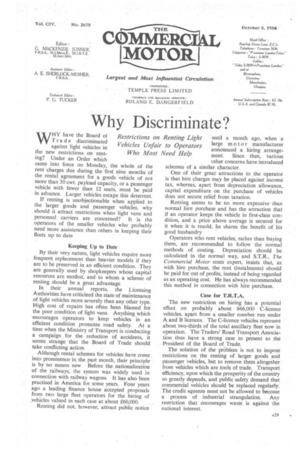Why Discriminate?
Page 31

If you've noticed an error in this article please click here to report it so we can fix it.
WHY have the Board of T rade discriminated against light vehicles in the new restrictions on renting? Under an Order which came into force on Monday, the whole of the rent charges due during the first nine months of the rental agreement for a goods vehicle of not more than 30 cwt. payload capacity, or a passenger vehicle with fewer than 12 seats, must be paid in advance. Larger vehicles escape this deterrent.
If renting is unobjectionable when applied to the larger goods and passenger vehicles, why should it attract restrictions when light vans and personnel carriers are concerned? It is the operators of the smaller vehicles who probably need more assistance than others in keeping their fleets up to date Keeping Up to Date By their very nature, light vehicles require more frequent replacement than heavier models if they are to be preserved in an efficient condition. They are generally used by shopkeepers whose capital resources are modest, and to whom a scheme of renting should be a great advantage In their annual reports, the Licensing Authorities have criticized the state of maintenance of light vehicles more severely than any other type. High cost of repairs has often been blamed for the poor condition of light vans. Anything which encourages operators to keep vehicles in an efficient condition promotes road safety. At a time when the Ministry of Transport is conducting a campaign for the reduction of accidents, it seems strange that the Board of Trade should take conflicting action.
Although rental schemes for vehicles have come into prominence in the past month, their principle is by no means new Before the nationalization of the railways, the system was widely used in connection with railway wagons. It has also been practised in America for some years. Four years ago a leading finance house accepted proposals from two large fleet operators for the hiring of vehicles valued in each case at about £60,000.
Renting did not, however, attract public notice until a month ago, when a large motor manufacturer announced a hiring arrangement. Since then, various other concerns have introduced schemes of a similar character.
One of their great attractions to the operator is that hire charges may be placed against income tax, whereas, apart from depreciation allowance, capital expenditure on the purchase of vehicles does not secure relief from taxation.
Renting seems to be no more expensive than normal hire purchase and has the attraction that if an operator keeps the vehicle in first-class condition, and a price above average is secured for it when it is resold, he shares the benefit of his good husbandry.
Operators who rent vehicles, rather than buying them, are recommended to follow the normal methods of costing. Depreciation should be calculated in the normal way, and S.T.R., The Commercial Motor costs expert, insists that, as with hire purchase, the rent (instalments) should be paid for out of profits, instead of being regarded as art operating cost. He has always recommended this method in connection with hire purchase.
Case for T.R.T.A.
The new restriction on hiring has a potential effect on probably about 666,000 C-licence vehicles, apart from a smaller number run under A and B licences. The C-licence vehicles represent about two-thirds of the total ancillary fleet now in operation. The Traders' Road Transport Association thus have a strong case to present to the President of the Board of Trade.
The solution of the problem is not to impose restrictions on the renting of larger goods and passenger vehicles, but to remove them altogether from vehicles which are tools of trade. Transport efficiency, upon which the prosperity of the country so greatly depends, and public safety demand that commercial vehicles should be replaced regularly. The credit squeeze must not be allowed to become a process of industrial strangulation. Any restriction that encourages waste is against the national interest.
















































































































